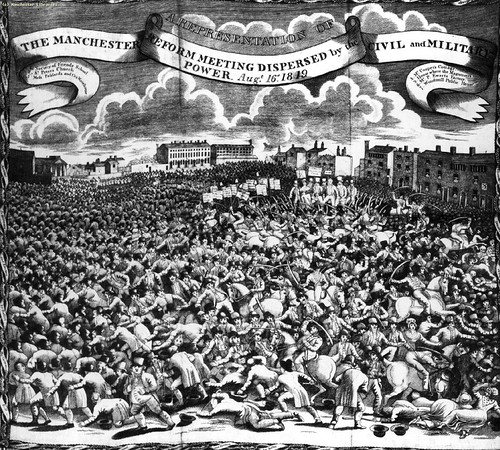 |
| from the Manchester Archives Flickr photoset
This is
not technically a book but a poem. It’s a long poem, though, and I’m sure
someone has sold it as a little book on its own. Plus, this is my challenge and
I’m cheating because I'm really behind. So there.
I wasn’t
going to post this at all but then I realised that this week it was the anniversary of the Peterloo Massacre – the event which inspired the
poem – and so it seemed pretty perfect.
What
was the Peterloo Massacre?
*puts on
Open University hat*
The
country had experienced famine and high unemployment in the years following the
Napoleonic Wars and the introduction of the Corn Laws. This suffering was
compounded by a lack of parliamentary representation for working people,
particularly in industrial areas like Manchester, where they were very few
members of parliament and even fewer voters. Spurred on by their extreme
poverty and lack of voice or help from the government, radical politics gained
popularity.
On the
16th August 1819, the Manchester Patriotic Union had organised a
demonstration for parliamentary reform with an address by leading radical Henry
Hunt. The protesters came to Peter's Field from all over Manchester and the surrounding areas –
one eyewitness estimated that the crowd equalled half the population of Manchester.
Because previous meetings of working people had been criticised and mocked for
their shabby appearance and disorderly conduct, the Peter’s Field protesters had
made efforts to be particularly well turned out and none of them were armed. Despite the peaceful nature of
the demonstration, local magistrates wanted to arrest Hunt and they called on
the Army to arrest him and disperse the crowd. The cavalry went in with their
sabres drawn and many in the crowd were unable to get away. In the chaos that
followed, 400-600 people were injured and 15 killed.
Why
should we care now?
*puts on
socialist ribbon*
The
Peterloo Massacre lead to the founding of the Manchester Guardian (which became
the modern-day Guardian newspaper) and was a really significant moment in
radical and working class politics, helping to bring about the Trades Union
movement.
THE
ACTUAL POEM
*puts on
English Graduate garment of some description*
Shelley
was in Italy at the time but when he heard about the massacre he was driven to
write the Masque of Anarchy, considered by many to be one of the greatest
political poems in the English language. I think it’s pretty good. Go and read
it.
Rise like Lions after slumber
In unvanquishable number,
Shake your chains to earth like dew
Which in sleep had fallen on you -
Ye are many - they are few..
How
excellent is that? I want everyone to read it and go, “YES! WE WILL RISE LIKE LIONS! WE ARE MANY AND THEY ARE FEW! LET’S SAVE THE NHS FROM THE TORY WANKBAGS!”
*takes off weird extra garments and gets back to drawing tattoos on self in biro* |
Sunday, 18 August 2013
The Masque of Anarchy - Percy Bysshe Shelley
Subscribe to:
Post Comments (Atom)

"*takes off weird extra garments and gets back to drawing tattoos on self in biro*"
ReplyDeleteI love you. As you know, I can't read poems because they are hard, but I totes feel like I've learnt stuff here so that's pretty awesome.